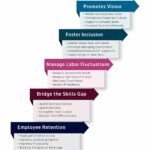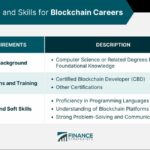In an ever-evolving job market, future-proofing your career is essential. Certain skills are likely to remain relevant longer than others, making them valuable for career longevity. This article discusses the importance of future-proofing your career, timeless skills, industries that will always require human skills, strategies to future-proof your career, and the role of education in this process.
Key Takeaways
- Future-proofing your career involves acquiring skills that remain in demand despite technological advancements and market changes.
- Critical thinking, problem-solving, emotional intelligence, adaptability, and digital literacy are skills that stand the test of time.
- Industries such as healthcare, education, creative arts, IT, and cybersecurity will always require human skills.
- Strategies to future-proof your career include continuous learning, networking, staying updated with industry trends, and embracing change and innovation.
- Education plays a crucial role in future-proofing your career, with a shift towards skill-based education and the value of lifelong learning becoming more apparent.
The Importance of Future-Proofing Your Career

Understanding the Concept of Future-Proofing
The concept of future-proofing your career is a proactive approach to ensuring your skills and knowledge remain relevant and in demand, regardless of changes in the job market. This involves anticipating future trends and adapting your skillset accordingly to maintain your employability.
Future-proofing is not just about acquiring new skills, but also about enhancing and updating existing ones. It’s about being adaptable and flexible, ready to learn and unlearn as the job market evolves.
Here are some key aspects of future-proofing your career:
- Continuous Learning: Embrace lifelong learning. Stay curious and open to new knowledge and skills.
- Adaptability: Be flexible and willing to change. Adaptability is a highly valued skill in the rapidly changing job market.
- Tech Savviness: As technology continues to advance, being tech-savvy is becoming increasingly important. Stay updated with the latest technological trends and tools.
- Networking: Building strong professional relationships can open up new opportunities and provide valuable insights into industry trends.
Remember, future-proofing your career is a continuous process, not a one-time task. It requires constant effort and commitment to stay ahead in the ever-evolving job market.
Why Future-Proofing Your Career is Essential
In the ever-evolving landscape of the professional world, future-proofing your career is not just a smart move, it’s essential. The rapid pace of technological advancement and the shift in industry trends mean that the skills and knowledge that are in demand today may not be the same in the future. This makes it crucial to focus on acquiring skills that are timeless and adaptable to various scenarios.
One of the key aspects of future-proofing your career is continuous learning. With the advent of artificial intelligence and data science, it’s important to stay updated with industry trends and advancements. This not only helps you stay relevant but also opens up new opportunities for growth and development.
Remember, the only constant in life is change. Embrace it, adapt to it, and let it drive your career forward.
Another important aspect is job security. While no career is entirely immune to changes, some professions have more stability than others. It’s important to consider job growth projections and the demand for your chosen profession. Here’s a simple table to illustrate this:
| Profession | Expected Job Growth | Projected Growth Rate |
|---|---|---|
| Data Science | High | 15% |
| Healthcare | Moderate | 10% |
| Education | Low | 5% |
Lastly, the role of education in future-proofing your career cannot be overstated. The level of education required for your desired profession is a key factor to consider. While some careers may only need a bachelor’s degree, others may demand a master’s degree or even a doctoral degree.
Skills That Stand the Test of Time

Critical Thinking and Problem-Solving
In the evolving job market, critical thinking and problem-solving skills are becoming increasingly essential. These skills encompass a range of cognitive abilities that enable a person to analyze a problem, think critically about it, and resolve the issue. For instance, these might include brainstorming, troubleshooting, or data analysis.
According to the World Economic Forum, critical thinking is listed as the second fastest skill on the rise and the highest priority for training. Employees or candidates who lack these skills could have difficulty dealing with the pace of AI-augmented work and making quick, decisive decisions that prevent workflow roadblocks.
Moreover, there’s a growing focus on people with analytical thinking and creativity. These skills are not just about solving problems but also about driving innovation and achieving professional success.
Remember: The ability to think critically and problem-solve will become more valuable as automation takes over more routine tasks. It includes skills like decision-making, creativity, and innovation.
To develop these skills, consider the following resources:
- Online courses and webinars
- Books and eBooks
- Mentoring and coaching
- Practice and real-world application
Emotional Intelligence and People Skills
In the evolving landscape of the professional world, emotional intelligence and people skills are becoming increasingly important. These skills encompass the ability to understand and manage your own emotions and responses, as well as being aware of others’ feelings and the impact you have on them. Examples of emotional intelligence in action include empathy, self-awareness, good listening skills, and sensitivity.
Employees with high levels of emotional intelligence can motivate their team members, resolve conflicts quickly, and contribute to a positive work environment. They stand out in the workplace, as they are often better at building and maintaining relationships, which is crucial in a team setting.
Tip: Cultivating emotional intelligence is not just about professional growth. It also contributes to personal development and well-being.
Here are some key components of emotional intelligence:
- Self-awareness: Understanding your own emotions and how they affect your thoughts and behavior.
- Self-management: Managing your emotions in healthy ways, taking initiative, following through on commitments, and adapting to changing circumstances.
- Social awareness: Understanding the emotions, needs, and concerns of other people, being able to pick up on emotional cues, feeling comfortable socially, and recognizing the power dynamics in a group or organization.
- Relationship management: Knowing how to develop and maintain good relationships, communicate clearly, inspire and influence others, work well in a team, and manage conflict.
In the future, as remote work and virtual teams become more prevalent, these skills will become even more essential.
Adaptability and Flexibility
In an ever-changing job market, adaptability and flexibility are crucial skills for future-proofing your career. These skills allow you to stay relevant and competitive, helping you stand out from other job candidates. Additionally, adaptability can help you navigate unexpected changes or challenges in your current role.
Consider how industries and job requirements have changed over time. For example, the rise of technology has transformed the job market, with many traditional jobs becoming automated or obsolete. This has led to new industries and job roles that require different skill sets. In addition, the ongoing COVID-19 pandemic has forced many industries to shift to remote work, further highlighting the need for adaptability.
Here are some ways to develop adaptability and flexibility:
- Embrace continuous learning: Stay updated with industry trends and acquire new skills.
- Be open to change: Welcome new technologies and methodologies in your work.
- Develop problem-solving skills: This helps you adapt to new situations and find solutions to unexpected problems.
Remember, continuous learning is key to success in today’s job market. By embracing new knowledge and skills, you can stay relevant and competitive and achieve your career goals.
Digital Literacy and Tech Savviness
In the digital age, Digital Literacy is a non-negotiable skill. It’s the ability to effectively use and understand digital technology. This includes not just the basic ability to navigate the internet or use software, but also the capacity to evaluate and interpret the vast amount of data we encounter daily. With the rise of AI and data-driven decision-making, this skill is becoming increasingly important.
Here are some key components of digital literacy:
- Understanding how to use digital tools and software
- Evaluating and interpreting digital information
- Safeguarding against digital threats and understanding digital ethics
- Using digital platforms to communicate and collaborate effectively
Remember, digital literacy is not just about consuming information, but also about creating and communicating it effectively.
Moreover, tech savviness goes hand in hand with digital literacy. It’s about staying updated with the latest technologies and understanding how they can be used to solve problems and improve efficiency. As we move forward, jobs requiring AI skills could rise by 40% in the next five years, making tech savviness a highly sought-after skill.
Industries That Will Always Need Human Skills

Education and Training
In the realm of education and training, the emphasis is increasingly shifting towards continuous learning and skill development. Lifelong learners are constantly upgrading their skills through both formal and informal training. Formal learning might include short courses in leadership at a local university, while informal training could be free courses offered by platforms like Coursera, edX, and Udemy.
Offering employee training and development opportunities has become an essential part of any modern company’s employee value proposition. This not only boosts engagement and retention rates but also helps attract top talent. In fact, studies show that 59% of employees believe that training improves their performance, and 76% of Millennials feel that professional development is essential for a strong company culture.
Moreover, the accessibility of education has been greatly enhanced with the advent of online courses. Many universities and colleges now offer online courses, making higher education and professional development more accessible than ever. To make continuous learning a part of your career, it’s crucial to set specific learning goals and create a plan to achieve them. This could involve taking courses, attending conferences, or networking with industry professionals.
Remember, continuous learning is a key to success in today’s job market. By embracing new knowledge and skills, you can stay relevant and competitive.
In today’s fast-paced digital transformation, industries are constantly changing and tools or technologies that are cutting-edge today may be outdated tomorrow. With routine tasks being managed by machines and AI, humans are expected to handle new and out-of-the-ordinary tasks, emphasizing the need for continuous learning and adaptability.
Creative Arts and Design
In the realm of Creative Arts and Design, the demand for human skills is not only persistent but also growing. This industry thrives on the unique and irreplaceable human ability to create, innovate, and interpret. Unlike many professions that are at risk of automation, creative roles such as artists, designers, writers, and musicians cannot be replicated by machines due to the inherent need for originality and emotional depth.
The creative industry values skills such as:
- Innovative thinking: The ability to come up with new and original ideas.
- Problem-solving: The capacity to find solutions to complex issues.
- Emotional intelligence: The understanding and managing of one’s own and others’ emotions.
Remember, creativity is not confined to traditional ‘creative’ roles. It is a valuable skill in any industry, as it drives innovation and progress.
Continuous learning and skill development are crucial in this industry. With the rapid evolution of technology, new tools and platforms are constantly emerging, offering new ways to create and share art. Staying updated with these trends and learning to adapt is key to future-proofing your career in Creative Arts and Design.
Information Technology and Cybersecurity
The field of Information Technology and Cybersecurity is one that will always be in high demand. As long as there is technology, there will be attempts to breach, harm, or damage these technologies and their associated information. This makes cybersecurity a skill that is always in demand, with the average U.S. annual salary of an information security engineer being over $100,000 at present.
Companies that run on technology, offer products and online services, or leverage complex digital systems need information security professionals to protect their business and customer data from malicious threats. The International Information System Security Certification Consortium (ISC2)’s research shows that the information security workforce gap is almost 500,000 in the U.S. and 4.07 million globally. The cybersecurity workforce is required to grow by 145% to close the skill gap and better defend enterprises globally.
Cybersecurity careers become increasingly secure and positions valued as uncertainty grows in the enterprise.
Aspirants who want to master information security skills must take professional courses and cybersecurity certification in different specialized verticals. They must know computer fundamentals, software, programs, malware, database security, understanding networking and network protocols, web applications, physical security, IoT, etc.
According to the Allied Market Research report, the global cyber security market size was $197.36 billion in 2020 and will reach $478.68 billion by 2030 at CAGR of 9.5% (from 2021 to 2030). These figures are clear indicators that cybersecurity and information security skills will be invaluable, even if other technological sectors encounter recession. Therefore, aspirants and professionals must opt for specialized courses to prepare well and protect their careers from recession.
Strategies to Future-Proof Your Career

Continuous Learning and Skill Development
In the ever-evolving job market, continuous learning is a crucial factor for staying competitive. It involves constantly seeking new knowledge, skills, and training to stay up-to-date with industry trends and advancements. This is particularly important in today’s workforce, where agility and versatility are highly valued. Embracing lifelong learning not only enables individuals to adapt to changing workplace demands but also empowers them to innovate and contribute meaningfully in their respective fields.
To make continuous learning a part of your career, consider the following steps:
- Set specific learning goals and create a plan to achieve them.
- Pursue higher education and professional development opportunities, many of which are now accessible online through universities and colleges.
- Attend conferences and network with industry professionals.
- Stay curious and open to new ideas and opportunities for growth.
Remember, continuous learning is not just about formal education. It also involves informal training, such as free courses by online platforms like Coursera, edX, and Udemy. The key is to stay curious and open to new ideas and opportunities for growth.
By embracing new knowledge and skills, you can stay relevant and competitive in your field, opening doors to new opportunities and boosting your confidence.
Networking and Building Professional Relationships
Networking is all about connecting with other professionals in your industry. Building relationships with them can help you access new opportunities, share knowledge and resources, and stay up-to-date with industry trends and developments. It can also help you establish a reputation and build your brand. You must identify the right people to connect with to network and collaborate effectively. Attend industry events, join professional organizations, and participate in online forums and social media groups to find like-minded individuals and potential mentors. Once you’ve connected with someone, take the time to build a relationship with them. Be genuine, show interest in their work, and be generous with your knowledge and resources.
Remember that networking is a two-way street; you’ll get the most out of it if you’re willing to give and receive. As for how networking and collaboration can help Gen Z stay ahead in the job market, it’s all about staying connected and adapting to change. The job market constantly evolves, and the skills and knowledge you need to succeed always change. By building a network of professionals in your industry, you’ll be better equipped to keep up with these changes and stay ahead of the curve. Collaborating with others can help you learn new skills, gain new perspectives, and stay motivated and inspired.
In conclusion, technology is changing the job market, and we must embrace it to stay competitive. We should develop skills that are in demand and cannot be replaced by machines. By doing so, we can position ourselves for success in the future job market.
Staying Updated with Industry Trends
In the rapidly evolving world of technology, staying updated with industry trends is not just beneficial, it’s essential. Artificial intelligence, data science, and computer science are shaping industries across the board. The ability to adapt to these technological advancements will set you apart in the job market. Prioritizing continuous learning and skill development will ensure you never fall behind.
To stay informed about the latest trends and developments, consider the following steps:
- Attend conferences related to your field.
- Regularly read industry publications.
- Participate in online forums and discussions.
Remember, the job market is changing, and you need to prepare yourself for the future by developing a wide range of skills and abilities that will be in high demand. By doing so, you can position yourself for success in an increasingly competitive landscape.
In addition to these, building a personal brand and establishing an online presence can also play a significant role in staying updated with industry trends. It not only helps in networking but also keeps you visible to potential opportunities.
Embracing Change and Innovation
In the rapidly evolving world of work, embracing change and innovation is not just an option, but a necessity. New technologies and emerging industries are continually reshaping the job market, making adaptability a crucial skill. To stay relevant, it’s essential to keep an open mind, embrace new experiences, and not hesitate to take risks.
Continuous learning is another key aspect of embracing change. It involves constantly seeking new knowledge, skills, and training to stay up-to-date with industry trends and advancements. This is particularly important for younger generations entering a highly competitive and rapidly changing workforce. Fortunately, numerous resources are available today to facilitate continuous learning.
- Embrace new technologies
- Stay updated with industry trends
- Seek continuous learning opportunities
- Take calculated risks
Remember, the future belongs to those who are prepared to change and innovate. So, stay curious, keep learning, and confidently embrace the future.
The Role of Education in Future-Proofing Your Career

The Value of Lifelong Learning
Embracing lifelong learning is crucial to remain competitive in the ever-evolving job market. This continuous pursuit of knowledge not only enables individuals to adapt to changing workplace demands but also empowers them to innovate and contribute meaningfully in their respective fields. In a landscape where agility and versatility are highly valued, enhancing skills cultivates resilience, boosts confidence, and opens doors to new opportunities. Whether it’s mastering digital literacy, honing critical thinking, or fostering interpersonal abilities, the pursuit of skill enhancement serves as a cornerstone for personal and professional growth.
Remember, continuous learning is a key to success in today’s job market. By embracing new knowledge and skills, you can stay relevant and competitive.
Ongoing curiosity and a willingness to learn and improve are traits that companies need in their employees if they want to innovate and succeed in competitive markets. Employees who are lifelong learners are constantly upgrading their skills with formal learning, such as short courses in leadership at their local university, or informal training, such as free courses by Coursera, edX, and Udemy. Offering employee training and development opportunities is an essential part of any modern company’s employee value proposition, which can boost engagement and retention rates and help attract top talent.
To make continuous learning a part of your career, start by setting specific learning goals and creating a plan to achieve them. This could involve:
- Taking courses
- Attending conferences
- Networking with industry professionals
It’s also essential to stay curious and open to new ideas and opportunities for growth. Many universities and colleges now offer online courses, making pursuing higher education and professional development more accessible than ever.
The Shift Towards Skill-Based Education
In the face of rapid technological advancements and evolving job markets, the blueprint for success in 2024 is clear: ‘upskill, upskill, upskill.’ Or, if you want to get technical, reskill too. This continuous commitment to skill improvement is crucial for remaining competitive as industries undergo constant transformation and automation. Embracing lifelong learning not only enables individuals to adapt to changing workplace demands but also showcases their skills, knowledge, and expertise.
As we move forward, a few skills are predicted to be in high demand. These include:
- Data Literacy: With the rise of technology and data-driven decision-making, the ability to collect, analyze, and interpret data is becoming increasingly important.
- Critical Thinking: As automation takes over more routine tasks, the ability to think critically and problem-solve will become more valuable. This includes skills like decision-making and creativity.
Over the next five years, the World Economic Forum (WEF) predicts that 83 million jobs will be lost and 69 million new ones created. This shift, driven by technology, increased global digital access, localization of supply chains, and a continued green transition, will make some in-demand skills more popular, like creative thinking, self-awareness, programming, and big data.
Remember: In today’s job market, companies are looking for agility and versatility. Enhancing your skills cultivates resilience, boosts confidence, and opens doors to new opportunities.
As more businesses go digital, there will be a higher demand for people with skills in these areas. However, technology is also making some traditional jobs obsolete. For example, automated machines are replacing assembly line workers, and self-driving cars may replace drivers in the future. Therefore, it’s essential to develop skills that are future-proof and cannot be replaced by machines. As Gen Z, we have grown up with technology and are comfortable using it to our advantage. We can leverage technology to learn new skills, making us even more valuable in the job market.
Conclusion
In an ever-evolving technological landscape, future-proofing your career is crucial. As we look towards 2024 and beyond, certain skills stand out as consistently in demand. From Robotic Process Automation (RPA) to cybersecurity, these skills span various branches of the tech industry. Continuous learning and skill development are key to staying relevant. While no career is entirely immune to changes, acquiring these in-demand skills can provide a degree of job security. Remember, the future belongs to those who prepare for it today.
Frequently Asked Questions
What are the skills likely to be in high demand in 2024 and beyond?
Some of the skills likely to be in high demand include Robotic Process Automation (RPA), Information Security, and other tech skills such as software and web development and data analysis. Other important skills include management, emotional intelligence, SQL, business analysis, and AI.
How is Robotic Process Automation (RPA) different from AI?
RPA involves teaching machines how to mimic human actions, such as performing repetitive tasks like giving auto-generated responses, filling forms, transferring data, copying instructions, etc. AI, on the other hand, involves creating intelligent machines that can perform tasks without being explicitly programmed to do so.
Are tech jobs recession-proof?
Tech jobs are often considered recession-proof because they are essential in maintaining and improving the digital infrastructure that modern society relies on. In times of disruption, the demand for tech professionals often increases as businesses and organizations strive to adapt and innovate.
How can I future-proof my career?
Future-proofing your career involves continuous learning and skill development, networking and building professional relationships, staying updated with industry trends, and embracing change and innovation. It’s also important to prioritize skills that are expected to be in high demand in the future.
What is the role of education in future-proofing a career?
Education plays a critical role in future-proofing a career. Lifelong learning, online learning platforms, and a shift towards skill-based education can help individuals stay relevant in their chosen field. It’s also important to focus on learning skills that are expected to be in high demand in the future.
What are some of the industries that will always need human skills?
Some industries that will always need human skills include healthcare and medicine, education and training, creative arts and design, information technology and cybersecurity. These industries rely heavily on skills such as critical thinking, problem-solving, emotional intelligence, and adaptability, which are difficult to automate.




